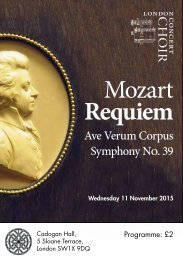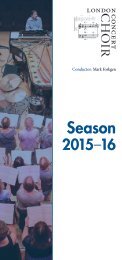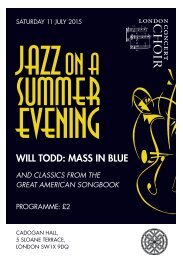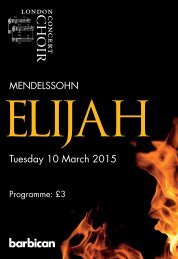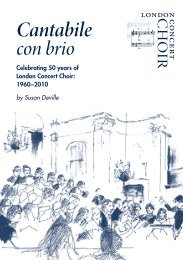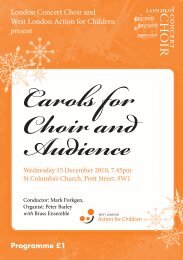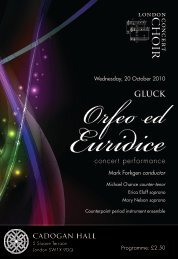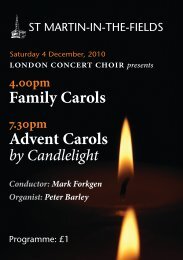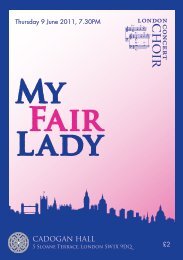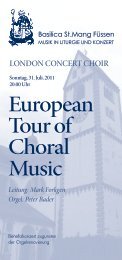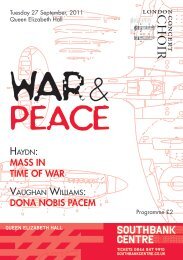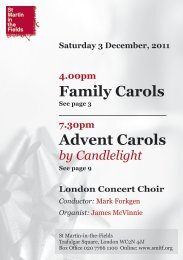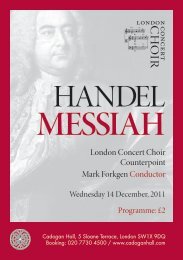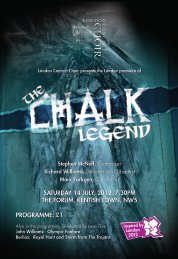17 July 2014: Le Stagioni/The Seasons (Haydn)
Create successful ePaper yourself
Turn your PDF publications into a flip-book with our unique Google optimized e-Paper software.
LONDON CONCERT CHOIR<br />
SOUTHBANK SINFONIA<br />
LE STAGIONI<br />
THE SEASONS<br />
di F.J. <strong>Haydn</strong><br />
Giovedi <strong>17</strong> Luglio <strong>2014</strong><br />
Assisi – Basilica Superiore di S. Francesco<br />
Diretto da: M° Mark Forkgen
• Si prega di spegnere i telefoni cellulari, i cercapersone e gli allarmi<br />
di orologi digitali.<br />
• Foto e registrazioni audio e video non sono consentite.<br />
<strong>Le</strong> Stagione: Testo inglese in una nuova traduzione di Michael Pilkington per il<br />
New Novello Choral Edition<br />
Traduzione italiana dall’originale tedesco pubblicata per gentile concessione<br />
dell’Accademia Nazionale di Santa Cecilia<br />
Programma disegnato da Stephen Rickett e curato da Eleanor Cowie<br />
London Concert Choir, società a responsabilità limitata, registrata in Inghilterra con il<br />
numero di registro 3220578 e come fondazione al numero di registro 1057242<br />
• Please switch off your mobile phone and pager, and any digital alarm<br />
on your watch.<br />
• Photography, and the use of any video or audio recording equipment,<br />
are forbidden.<br />
<strong>The</strong> <strong>Seasons</strong><br />
Words by Gottfried Van Swieten.<br />
Music by Franz Joseph <strong>Haydn</strong><br />
English Translation by Michael Pilkington<br />
© Copyright Novello & Company Limited.<br />
All Rights Reserved. International Copyright Secured.<br />
Used by permission of Novello & Company Limited.<br />
Italian translation from the original German published by kind permission of the<br />
Accademia Nazionale di Santa Cecilia<br />
Programme designed by Stephen Rickett and edited by Eleanor Cowie<br />
London Concert Choir - A company limited by guarantee, incorporated in England<br />
with registered number 3220578 and registered charity number 1057242<br />
www.london-concert-choir.org.uk
Basilica di San Francesco, Assisi<br />
Giovedi <strong>17</strong> Luglio / Thursday <strong>17</strong> <strong>July</strong> <strong>2014</strong><br />
LE STAGIONI / THE SEASONS<br />
di F.J. <strong>Haydn</strong><br />
Mark Forkgen Direttore / Conductor<br />
Rachel Elliott soprano<br />
Nicholas Hurndall Smith tenore<br />
Toby Stafford-Allen basso<br />
London Concert Choir<br />
Southbank Sinfonia<br />
Ci sarà un INTERVALLO di 20 minuti al termine della seconda parte<br />
<strong>The</strong>re will be an INTERVAL of 20 minutes after Part Two
Franz Joseph <strong>Haydn</strong> (<strong>17</strong>32-1809)<br />
LE STAGIONI<br />
Oratorio in quattro parti per solisti, coro e orchestra<br />
L’oratorio <strong>Le</strong> <strong>Stagioni</strong> di <strong>Haydn</strong> è un’evocazione gioiosa del mondo in cui egli è<br />
cresciuto. Fu spinto a comporlo dal grande successo della Creazione e questa fu<br />
la sua ultima grande opera, che fu rappresentata per la prima volta a Vienna nel<br />
1801. Il suo librettista, il barone Gottfried van Swieten, adattò il testo da una poesia<br />
popolare dallo stesso titolo opera del poeta scozzese James Thompson, trasponendone<br />
l’ambientazione dalla Scozia al Burgenland, paese austriaco di origine di <strong>Haydn</strong>.<br />
Quattro cantate descrivono il cambiamento delle stagioni, dalla primavera<br />
all’inverno, e la vita e le attività quotidiane della gente di campagna. Dall’aratura<br />
e la semina, al pascolo delle pecore e l’accogliere il sole estivo, la mietitura, la<br />
caccia, e il tremare nel freddo invernale, <strong>Haydn</strong> celebra il mondo pastorale e il suo<br />
Creatore in musica con grande vitalità e immaginazione.<br />
L’opera sarà cantata in inglese. I solisti rappresentano il contadino Simone (basso),<br />
Vanna, sua figlia (soprano) e Luca, un giovane contadino (tenore). Il coro riveste<br />
di volta in volta il ruolo di contadini, di cacciatori, di giovani e di fanciulle, e della<br />
gente di campagna. Come sarà evidente, l’orchestra rappresenta molte creature e<br />
gli umori della natura con intenso realismo.<br />
La Primavera<br />
Un’introduzione orchestrale descrive il passaggio dall’inverno alla primavera,<br />
l’inverno evocato con musica burrascosa e densamente contrappuntistica, con i<br />
tromboni in primo piano; la primavera con arie e scambi tra violini e strumenti a<br />
fiato. I tre solisti annunziano un coro bucolico e aggraziato di benvenuto: ‘Vieni,<br />
dolce primavera!’ col suo contrasto di voci di donne e di uomini. C’è un recitativo<br />
di basso e un’aria, ‘Già lieto s’affretta il contadino’, in cui l’aratore, o meglio<br />
l’ottavino, zufola un recente successo dalla Sinfonia ‘la Sorpresa’.<br />
Nella seconda metà della ‘Primavera’, Luca, e poi il trio, guidano il coro con una<br />
preghiera di ringraziamento: ‘Ora sii pietoso, soave Cielo!’ comincia con un<br />
sereno inno melodico, e termina con un’ardente fuga che cita il Requiem di Mozart.<br />
Nel ‘Canto di gioia’ – ‘O com’è tenero adesso lo spettacolo della campagna!’ –<br />
gli strumenti dell’orchestra imitano con grande immaginazione vari aspetti della<br />
natura. Questa stagione chiude con un’introduzione maestosa ed un inno di lode<br />
‘Eterno, possente, benevolo Dio!’ che conduce ad una fuga handeliana.
Franz Joseph <strong>Haydn</strong> (<strong>17</strong>32-1809)<br />
THE SEASONS<br />
Oratorio in four parts for soloists, chorus and orchestra<br />
<strong>Haydn</strong>’s oratorio <strong>The</strong> <strong>Seasons</strong> is a joyous evocation of the world in which he<br />
had grown up. He was encouraged to compose it by the universal success of <strong>The</strong><br />
Creation and it was his last major work, first performed in Vienna in 1801. His<br />
librettist, Baron Gottfried van Swieten, adapted the text from a popular poem of the<br />
same name by the Scottish poet James Thompson, but transposed its setting to the<br />
Burgenland, <strong>Haydn</strong>’s Austrian homeland.<br />
Four cantatas describe the changing seasons from Spring through to Winter and the<br />
daily life and activities of the country people. From ploughing and sowing, tending<br />
the sheep and welcoming the summer sun, to harvesting, hunting, and shivering in<br />
the cold of winter, <strong>Haydn</strong> celebrates the pastoral world and its Creator in music full<br />
of vitality and imagination.<br />
<strong>The</strong> work will be sung in English. <strong>The</strong> soloists represent the farmer Simon (bass),<br />
Jane, his daughter (soprano) and Lucas, a young countryman (tenor). <strong>The</strong> choir<br />
plays the various roles of peasants, hunters, young men and girls, and country<br />
people. As will be obvious, the orchestra represents many creatures and moods of<br />
nature in vivid style.<br />
Spring<br />
An orchestral introduction depicts the passage from Winter to Spring, the former<br />
evoked in blustery, densely contrapuntal music, trombones to the fore; the latter in<br />
airy exchanges between violins and wind. <strong>The</strong> three soloists usher in a graceful<br />
bucolic chorus of welcome: ‘Come, gentle Spring!’ with its contrast of women’s and<br />
men’s voices. <strong>The</strong>re is a bass recitative and air, ‘With joy th’impatient husbandman’,<br />
in which the ploughman, or rather the piccolo, whistles a recent hit from the<br />
‘Surprise’ Symphony.<br />
In the second half of ‘Spring’, Lucas, and then the trio, lead the chorus in thankful<br />
prayer: ‘Now be gracious, bounteous Heav’n’ begins with a serene, hymnic<br />
melody, and ends with a fervent fugue quoting from Mozart’s Requiem. In the<br />
‘Song of Joy’ – ‘O how lovely is the landscape’ – the instruments of the orchestra<br />
vividly imitate aspects of nature. This season closes with a majestic introduction<br />
and a hymn of praise ‘Wonderful, powerful, merciful God!’, leading to a<br />
Handelian fugue.
L’Estate<br />
L’introduzione dipinge l’alba, ed in particolare l’oboe rappresenta il canto del<br />
gallo. Simone, assistito da un obbligato di corno porta fuori i greggi. Trio e coro<br />
dipingono l’aurora con una melodia orchestrale sempre più vivace. Essa è seguita<br />
da un coro euforico in onore del sole, ‘Gloria! O sole, gloria!’, con interludi lirici<br />
per il trio solista.<br />
La scena si oscura in un recitativo funesto, punteggiato dal rumore distante del<br />
tuono, poi con una saetta eseguita dal flauto, scoppia la tempesta nel primo grande<br />
ritratto-in-musica romantico di elementi di guerra. Alla fine la tempesta cessa tra<br />
saltuari bagliori di lampi e si ritorna alla normale vita di campagna. Il trio ci offre i<br />
muggiti delle mandrie, le quaglie, i grilli, le rane ed il coprifuoco delle otto di sera<br />
con specifici suoni strumentali prima che il coro degli abitanti del villaggio si diriga<br />
sonnolento verso casa a dormire.<br />
L’Autunno<br />
‘L’Autunno’ inizia con un’overture in stile di minuetto. <strong>Haydn</strong> scrive: “L’introduzione<br />
indica la soddisfazione del contadino per il raccolto abbondante”. Poi segue uno<br />
dei motivi più maestosi di <strong>Haydn</strong>, nel quale il trio introduce un prolungato coro sulle<br />
virtù dell’essere operosi, ‘O lavoro, o nobile lavoro!’, che ha il suo culmine in una<br />
magnifica fuga del coro.<br />
<strong>Le</strong> scene di caccia che seguono sono ritratte con gusto da <strong>Haydn</strong> che in gioventù<br />
fu un entusiasta cacciatore. La battuta di caccia agli uccelli è descritta da Simone<br />
in un recitativo ed aria di stile barocco, dopo il quale un breve recitativo di Luca<br />
sulla caccia alla lepre introduce un coro spettacolare di caccia, con i tradizionali<br />
richiami di caccia dei corni, mentre i cani che abbaiano inseguono il cervo fino<br />
alla sua morte.<br />
L’Inverno<br />
L’introduzione e il recitativo di Simone “dipingono le fitte nebbie all’inizio<br />
dell’inverno”. Il recitativo di Vanna parla dell’inverno che avanza dalle caverne<br />
della Lapponia, ed il suo è un canto di giorni pesanti e di lunghe notti. Luca canta<br />
del viaggiatore perso nel paesaggio ghiacciato, la cui crescente ansia e paura<br />
lasciano il posto al sollievo e alla gioia per la luce di una locanda amica.<br />
Simone moralizza sul passaggio dalla primavera all’inverno descrivendolo come<br />
una metafora della perdita delle speranze terrene e dei programmi futuri quando la<br />
vecchiaia avanza. ‘Resta soltanto la virtù’, asserisce nel suo nuovo ruolo di filosofo.<br />
Nel numero finale tutti si uniscono in una lode ai virtuosi, celebrando la certezza<br />
della salvezza con una magnifica fuga ‘Ci guidi la tua mano, oh Dio!’, che culmina<br />
nella visione del glorioso regno del Cielo.
Summer<br />
<strong>The</strong> introduction paints the dawn, and in particular the oboe represents<br />
cockcrow. Simon, assisted by a horn obbligato, takes the flocks out. Trio and<br />
chorus depict the sunrise to ever more brilliant orchestral sound. This is followed<br />
by an exhilarating chorus in praise of the sun, ‘Hail, O sun, all hail!’, with lyrical<br />
interludes for the solo trio.<br />
<strong>The</strong> scene darkens in a baleful recitative, punctuated by distant thunder, then,<br />
with forked lightning on the flute, the tempest erupts in the first great Romantic<br />
picture-in-sound of the warring elements. Finally the tempest recedes amid<br />
desultory lightning flashes and normal rustic life resumes. <strong>The</strong> trio give us<br />
lowing herds, quails, crickets, frogs and an eight-o’clock curfew with the<br />
appropriate instrumental sounds before the chorus of villagers heads drowsily<br />
home to sleep.<br />
Autumn<br />
‘Autumn’ begins with a minuet-like overture. <strong>Haydn</strong> writes, “<strong>The</strong> introduction<br />
indicates the husbandman’s satisfaction at the abundant harvest”. <strong>The</strong>re<br />
is then one of <strong>Haydn</strong>’s grandest designs, in which the trio introduce an<br />
extended chorus on the virtues of industry, ‘O toil, O noble toil’, culminating in a<br />
magnificent choral fugue.<br />
<strong>The</strong> hunting scenes that follow are portrayed with relish by <strong>Haydn</strong>, who<br />
had been an enthusiastic huntsman in his younger days. <strong>The</strong> bird shoot is<br />
described by Simon in a recitative and Baroque-style aria, after which a brief<br />
recitative about hare-coursing by Lucas introduces a spectacular hunting chorus,<br />
with traditional hunting calls from the horns, as barking hounds chase the stag<br />
to his death.<br />
Winter<br />
<strong>The</strong> introduction and Simon’s recitative “paint the thick fogs at the beginning of<br />
Winter”. Jane’s recitative speaks of Winter striding out from the caves of Lapland,<br />
and her song is of heavy days and long nights. Lucas sings of the traveller lost in the<br />
frozen landscape, whose mounting anxiety and fear are replaced by relief and joy<br />
at the light of a friendly tavern.<br />
Simon moralises on the passage from Spring to Winter as a metaphor for the<br />
decline of earthly hopes and plans as old age approaches. ‘Only virtue stays’, he<br />
asserts in his new role of philosopher. In the final number all unite in praise of the<br />
virtuous, celebrating the certainty of salvation in a magnificent fugue, ‘Direct us in<br />
thy ways, O God’, which culminates in a vision of ‘the glorious realm of Heaven’.
Text of the Oratorio / Testo dell’Oratorio<br />
SPRING<br />
INTRODUCTION: Largo - Vivace<br />
RECITATIVE<br />
Simon<br />
Behold how surly Winter flies;<br />
to polar regions now he goes.<br />
Now follows at his call<br />
the savage storm’s tumultuous host<br />
with all its dreadful roar.<br />
Lucas<br />
And see, from craggy rocks the snow<br />
in muddy streams flows down the slopes!<br />
Jane<br />
And see how from the South,<br />
by mild and gentle winds allur’d,<br />
the Spring again appears.<br />
CHORUS OF COUNTRY FOLK<br />
Come, gentle Spring!<br />
<strong>The</strong> gift of heaven, come!<br />
From deathly winter sleep<br />
bid Nature now awake!<br />
And now she nears, the gentle Spring,<br />
her soft and balmy breath we feel,<br />
and soon will life to all return.<br />
But yet do not too soon rejoice,<br />
for oft, enwrapp’d in mist and fog,<br />
the Winter will return and spread<br />
o’er bud and flow’r his chilling frost.<br />
Come, gentle Spring!<br />
<strong>The</strong> gift of heaven, come!<br />
Upon our meadows now descend!<br />
O come, gentle Spring O come,<br />
return, delay no more!<br />
RECITATIVE - Simon<br />
From Aries now the sun<br />
shines brightly down upon us here.<br />
Now frost and fog retire,<br />
and mild mists hover all about;<br />
our mother earth is now revived,<br />
enliven’d is the air.<br />
LA PRIMAVERA<br />
INTRODUZIONE : Largo - Vivace<br />
RECITATIVO<br />
Simone<br />
Guardate come fugge il duro inverno,<br />
si rifugia nel lontano Polo.<br />
Lo segue, rispondendo al richiamo,<br />
la rumorosa schiera delle selvagge tempeste,<br />
con urli orribili.<br />
Luca<br />
Guardate come la neve sgocciola<br />
in turbolenti fiotti dalla salda roccia!<br />
Vanna<br />
Guardate come avanza dal sud,<br />
dolcemente attratta dai tiepidi venti,<br />
la messaggera della primavera.<br />
CORO DI CONTADINI<br />
Vieni, dolce primavera!<br />
Dono del Cielo, vieni!<br />
Risveglia la natura<br />
dal suo sonno mortale!<br />
S’avvicina la dolce primavera,<br />
già sentiamo il tenero sospiro,<br />
presto tutto rinascerà.<br />
Non gioite troppo presto,<br />
sovente l’inverno, cinto di nebbia,<br />
torna strisciando e spande<br />
il suo nero veleno su fiori e germogli.<br />
Vieni, dolce primavera!<br />
Dono del Cielo, vieni!<br />
Scendi sui nostri campi,<br />
oh vieni, dolce primavera, oh vieni,<br />
non indugiare più.<br />
RECITATIVO - Simone<br />
Dall’Ariete scende adesso<br />
su noi il raggio del chiaro sole.<br />
Cedono ora gelo e bruma,<br />
ovunque si spandono esili vapori,<br />
si libera il seno della terra.<br />
l’aria si rasserena.
ARIA - Simon<br />
With joy th’impatient husbandman<br />
sets forth to till the field,<br />
the furrow’s length he strides along<br />
and whistles as he ploughs.<br />
And then with slow and measur’d step<br />
he casts the seed abroad,<br />
by faithful earth preserv’d it soon<br />
will grow to golden com.<br />
RECITATIVE - Lucas<br />
<strong>The</strong> farmer now his work hath done,<br />
avoiding neither pain nor toil;<br />
the hand of nature will in time provide<br />
reward; for this he pleads<br />
and so he prays to Heaven above.<br />
PRAYER - TRIO AND CHORUS<br />
Now be gracious, bounteous Heaven,<br />
open wide, and pour thy blessings<br />
over all our lands below.<br />
<strong>Le</strong>t earth receive the dew’s refreshment.<br />
<strong>Le</strong>t rainfall now enrich the furrows.<br />
And let thy breezes gently blow,<br />
thy sun send forth his shining rays!<br />
To us abundant life will flow,<br />
and we will give thee thanks and praise.<br />
RECITATIVE - Jane<br />
Our fervent prayers are heard;<br />
the warm west wind arises and fills<br />
the sky above with sailing clouds.<br />
<strong>The</strong> clouds increase; they now descend,<br />
and pour into the lap of earth<br />
the pride and wealth of Nature’s store.<br />
SONG OF JOY<br />
Jane, Lucas and Chorus<br />
O how lovely is the landscape<br />
spread before our eyes!<br />
Come, dear maidens, let us wander<br />
o’er the verdant fields!<br />
O how lovely is the landscape<br />
spread before our eyesl<br />
Come, young fellows, let us wander<br />
through the fresh green woods!<br />
ARIA - Simone<br />
Già lieto s’affretta il contadino<br />
al lavoro dei campi,<br />
cammina su lunghi solchi<br />
dietro l’aratro fischiettando.<br />
Poi, con misurato passo,<br />
spande la semente,<br />
che il campo cela fedele<br />
e presto fa maturare in frutti dorati<br />
RECITATIVO - Luca<br />
Il contadino ha compiuto l’opera sua,<br />
non ha risparmiato fatica né pena:<br />
lo attende il compenso<br />
dalle mani della natura,<br />
e ne ringrazia il Cielo.<br />
PREGHIERA - TERZETTO E CORO<br />
Ora sii pietoso, soave Cielo!<br />
Schiuditi e spandi la tua benedizione<br />
sul nostro paese!<br />
Fa’ che la tua rugiada bagni la terra!<br />
Fa’ che l’acquazzone inondi i solchi!<br />
Fa’ che i tuoi venti soffino lievi!<br />
Fa’ che il tuo sole splenda luminoso!<br />
Allora avremo l’abbondanza,<br />
ringraziamenti e lodi alla tua bontà.<br />
RECITATIVO - Vanna<br />
Esaudito è il nostro voto,<br />
il tiepido vento di ponente riscalda<br />
e colma l’aria di umidi vapori.<br />
S’accumulano - ora cadono<br />
e versano nel grembo della terra<br />
la bellezza e la ricchezza della natura.<br />
CANTO DI GIOIA<br />
Vanna, Luca i Coro<br />
Oh com’è tenero adesso lo spettacolo<br />
della campagna!<br />
Venite, fanciulle, passeggiamo<br />
nei variopinti campi!<br />
Oh com’è tenero adesso lo spettacolo<br />
della campagna!<br />
Venite, giovanotti, passeggiamo<br />
nel verde boschetto!
See the lilies, see the roses,<br />
all the flow’rs in bloom!<br />
See the pastures, see the meadows,<br />
see the open fields.<br />
See the mountains, see the rivers,<br />
see the sparkling airl<br />
All is living, all is floating,<br />
ev’ry creature now astir.<br />
See the lambs, how they are leaping!<br />
See the shoals of fishes swimming!<br />
See how all the bees are swarming!<br />
See the birds now all aflutter!<br />
O what pleasure, what enjoyment<br />
swells within our hearts!<br />
Sweetest fancies, gentle charms<br />
bring gladness to our souls.<br />
That which touches and delights you<br />
is the presence of the breath of God.<br />
<strong>Le</strong>t us honour, let us worship,<br />
let us give our praise to him!<br />
In resounding song to thank him<br />
raise your voices high.<br />
Trio and Chorus<br />
Wonderful, powerful, merciful God!<br />
From thy most blessed table<br />
dost thou provide our food,<br />
From streams of joy unending<br />
thou givest us to drink.<br />
Glory, laud and praise be thine,<br />
wonderful, merciful God.<br />
SUMMER<br />
INTRODUCTION: Adagio<br />
RECITATIVE<br />
Lucas<br />
In misty mantle now draws near<br />
the gentle morning light;<br />
with limping step at her approach<br />
the weary night retires.<br />
To dark and gloomy caves the birds<br />
of doom now take their flight,<br />
and with their mournful cries<br />
appal the timid heart no more.<br />
Guardate il giglio, guardate la rosa,<br />
guardate ogni fiore!<br />
Guardate i prati, guardate le praterie,<br />
guardate ogni campo<br />
Guardate la terra, guardate le acque,<br />
guardate l’aria serena!<br />
Tutto vive, tutto si libra<br />
tutto si muove<br />
Guardate come balzano gli agnelli!<br />
Guardate come brulicano i pesci!<br />
Guardate come sciamano le api!<br />
Guardate come svolazzano gli uccelli!<br />
Che gioia, che piacere<br />
ci inonda il cuore!<br />
Dolci impulsi, soavi rapimenti<br />
sollevano il nostro petto!<br />
Quel che sentite, quel che vi rapisce,<br />
è il soffio del Creatore!<br />
Onoriamolo, lodiamolo, esaltiamolo!<br />
Innalziamo, per ringraziarlo,<br />
le nostre voci! S’innalzino,<br />
per ringraziarlo, le nostre voci!<br />
Terzetto e Coro<br />
Eterno, possente, benevolo Dio!<br />
Alla tua mensa benedetta<br />
tu ci hai confortati.<br />
Col fiume delle tue gioie<br />
tu ci hai abbeverati.<br />
Onore, lode e gloria a te,<br />
eterno, possente, benevolo Dio!<br />
L’ESTATE<br />
INTRODUZIONE : Adagio<br />
RECITATIVO<br />
Luca<br />
In grigio velo avanza<br />
la tenera luce del mattino;<br />
con zoppi passi si ritira<br />
davanti a lei la pigra notte.<br />
In oscure grotte fugge<br />
la cieca schiera degli uccelli dei morti;<br />
i loro suoni lamentosi<br />
più non opprimono il cuore angosciato.
Simon<br />
<strong>The</strong> herald of the new-born day,<br />
with sharp and penetrating voice,<br />
to new activity now calls<br />
the shepherd from his rest.<br />
ARIA - Simon<br />
So now the cheerful shepherd goes<br />
to gather all his bleating flock;<br />
to pastures rich he drives them out,<br />
slowly o’er the verdant hills.<br />
Towards the East he gazes then,<br />
while leaning on his shepherd’s crook,<br />
and waits to see the rising sun<br />
shed abroad his glorious light.<br />
Simone<br />
Si annuncia l’araldo del giorno;<br />
con suono potente chiama<br />
a nuova attività<br />
il riposato contadino.<br />
ARIA - Simone<br />
L’allegro pastore ora aduna<br />
intorno a sé i lieti greggi,<br />
a ricco pasto su verdi colline<br />
lentamente li sospinge.<br />
Poi, guardando a oriente sta<br />
appoggiato al suo bastone,<br />
per scorgere il primo raggio di sole,<br />
ch’egli attende con impazienza.<br />
RECITATIVE - Jane<br />
<strong>The</strong> rosy dawn breaks forth in light;<br />
like wisps of smoke the clouds disappear;<br />
the heav’n is clothed resplendent in blue,<br />
the mountain peaks in fiery gold.<br />
TRIO AND CHORUS<br />
And now ascends the sun, he climbs,<br />
he nears, he comes, he beams, he shines.<br />
Now shine with glorious pow’r<br />
the fires of his majesty.<br />
Hail, O sun, all hail!<br />
<strong>The</strong> source of light and life, all hail!<br />
Thou soul and eye of all the worlds,<br />
thou God-like shining star.<br />
We give thee grateful thanks.<br />
For who can tell the jubilation<br />
thy gracious presence stirs in us?<br />
Who numbers them, the many blessings<br />
that of thy kindness we receive?<br />
<strong>The</strong> jubilation, who can tell?<br />
Thy blessings, O who numbers them? Who?<br />
All thanks to thee for giving joy.<br />
All thanks to thee for giving life.<br />
All thanks to thee for giving health.<br />
But more to God who gave to thee<br />
the pow’r thy beams display.<br />
Hail, O sun, all hail!<br />
the source of light and life, all hail!<br />
Now praises come from all men,<br />
these praises nature joins.<br />
RECITATIVO - Vanna<br />
L’aurora comincia a splendere,<br />
come fumo si sperde la leggera<br />
nuvolaglia,<br />
il cielo riluce in chiaro azzurro,<br />
le cime dei monti in oro infuocato.<br />
TERZETTO E CORO<br />
Sorge il sole, sorge.<br />
S’avvicina, viene, brilla, risplende.<br />
Risplende in luce stupenda,<br />
in fiammeggiante maestà!<br />
Gloria! Oh sole, gloria!<br />
Fonte della luce e della vita, gloria!<br />
Tu anima e occhio dell’universo,<br />
bellissima immagine della divinità!<br />
Ti salutiamo riconoscenti!<br />
Chi può dire ogni gioia<br />
che in noi ridesta il tuo favore?<br />
Chi può contare ogni benedizione<br />
che su noi riversa la tua clemenza?<br />
<strong>Le</strong> gioie! Oh chi le può dire?<br />
<strong>Le</strong> benedizioni! Oh chi le può contare, chi?<br />
Ti ringraziamo per quel che ci rallegra!<br />
Ti ringraziarne per quel che ci anima.<br />
Ti ringraziarne per quel che ci fa vivere.<br />
Ma dobbiamo al Creatore<br />
ogni nostra forza.<br />
Gloria! Oh sole, gloria!<br />
Fonte della luce e della vita, gloria!<br />
Ti acclama ogni voce,<br />
ti acclama la natura.
RECITATIVE<br />
Simon<br />
O see! <strong>The</strong>re rises in the sultry air,<br />
close by the border of the hills,<br />
a pallid fog of mist and vapour form’d.<br />
‘Tis small at first, but now expands,<br />
and soon black darkness covers<br />
all beneath the gloomy sky.<br />
Lucas<br />
Hear, from the vale, how the dull roar<br />
announces storm to come!<br />
See how the baleful cloud<br />
with slow progression makes its way<br />
and threatens all the land below!<br />
Jane<br />
In dread foreboding<br />
all living Nature waits.<br />
No beast, no leaf dares stir itself.<br />
A deathly hush is all around.<br />
CHORUS<br />
Ah, the thunderstorm comes near!<br />
Help us, heaven!<br />
O how the thunder rolls!<br />
Now rage the winds about us!<br />
Where shall we fly?<br />
Flashes of lightning now streak through<br />
the air,<br />
the bolts from the sky now burst the<br />
clouds open,<br />
to pour down torrents of rain.<br />
Where is safety? Heaven help us!<br />
Dreadful roars the storm.<br />
<strong>The</strong> open sky is aflame.<br />
Save us wretches!<br />
Crashing, smashing, crack on crack<br />
the thunder rolls with awful noise.<br />
Save us! Save us!<br />
<strong>The</strong> whole world shakes and trembles<br />
e’en to the ocean floor.<br />
RECITATIVO<br />
Simone<br />
Oh guardate! Nell’aria afosa sale<br />
sull’alta cresta del monte<br />
una pallida nube di vapore e fumo.<br />
Spinta in alto, si estende,<br />
presto ricopre tutto il cielo<br />
di nera oscurità.<br />
Luca<br />
Sentite come dalla valle un sordo mugghio<br />
annuncia la selvaggia tempesta!<br />
Guardate come, gravida di sventura,<br />
la cupa nube s’allarga lenta,<br />
e minacciosa scende sulla pianura!<br />
Vanna<br />
In timoroso presentimento s’arresta<br />
la vita della natura:<br />
non un animale, non una foglia si muove,<br />
silenzio di morte regna all’intorno.<br />
CORO<br />
Ahimè, s’avvicina l’uragano!<br />
Aiutaci, Cielo!<br />
Oh come rimbomba il tuono!<br />
Oh come infuriano i venti!<br />
Dove ci rifugiamo?<br />
Fiammeggianti fulmini sconvolgono<br />
l’aria;<br />
le puntute frecce squarciano la nube,<br />
e torrenti piombano al suolo.<br />
Dove salvarci? Aiutaci, Cielo!<br />
Furente imperversa la tempesta;<br />
arde il vasto cielo.<br />
Miseri noi!<br />
Con frastuono crepitano paurosamente<br />
colpo su colpo i terribili tuoni.<br />
Ahimè! Ahimè!<br />
Scossa la terra vacilla<br />
fin nel fondo del mare.
TRIO AND CHORUS<br />
And now the storm has passed away;<br />
the clouds disperse, the winds die down.<br />
Before the time to set has come<br />
the sun looks out once more,<br />
and so his final sparkling rays<br />
with pearls adorn the fields.<br />
Now to its well-accustom’d home,<br />
enliven’d and refreshed,<br />
the well-fed herd returns.<br />
<strong>The</strong> quail already calls his mate.<br />
<strong>The</strong> cricket chirps from out the grass.<br />
<strong>The</strong> frog is croaking in the marsh;<br />
the distant curfew now tolls.<br />
<strong>The</strong> evening star shines from above,<br />
inviting us to soft repose.<br />
Maidens, young men, women, come!<br />
Soothing sleep awaits us now,<br />
for this is granted honest hearts<br />
and healthy bodies after toil.<br />
We come. We follow you.<br />
<strong>The</strong> distant curfew now has tolled.<br />
<strong>The</strong> evening star shines from above, etc.<br />
AUTUMN<br />
INTRODUCTION: Allegretto<br />
RECITATIVE<br />
Jane<br />
What with all its blossoms<br />
was promis’d by the Spring,<br />
what the warmth of Summer<br />
to welcome ripeness brought,<br />
Autumn with its fullness<br />
shows to the farmer now.<br />
Lucas<br />
For there on heavy loaded carts<br />
th’abundant harvest home is borne.<br />
<strong>The</strong> plenty that the fields provide<br />
his massive barns can scarce contain.<br />
Simon<br />
With cheerful eye he looks around,<br />
and measures all the bounteous produce<br />
there, and pleasure floods into his heart.<br />
TERZETTO E CORO<br />
<strong>Le</strong> cupe nubi si separano;<br />
è placata la furia delle tempeste.<br />
Prima del suo tramonto<br />
lancia ancora sguardo;<br />
prima d’un ultimo raggio illumina<br />
il campo adorno di perle.<br />
Verso la consueta stalla ritorna,<br />
sazio e ristorato,<br />
il grasso vitello.<br />
La quaglia già chiama il maschio.<br />
Nell’erba canta lieto il grillo.<br />
E dal pantano gracida il rospo.<br />
Suona la campana della sera.<br />
Dall’alto scintilla l’astro lucente<br />
e ci invita a soave quiete.<br />
Fanciulle, giovanotti, donne, venite!<br />
Ci attende il dolce sonno,<br />
che puro cuore, corpo sano<br />
e giornaliero lavoro ci assicurano.<br />
Andiamo, andiamo, vi seguiamo.<br />
È suonata la campana della sera.<br />
Dall’alto scintilla l’astro lucente ecc.<br />
L’AUTUNNO<br />
INTRODUZIONE: Allegretto<br />
RECITATIVO<br />
Vanna<br />
Quel che con la sua fioritura<br />
la primavera aveva promesso,<br />
quel che col suo calore<br />
l’estate ha fatto maturare,<br />
l’autunno adesso rivela<br />
in abbondanza al lieto contadino.<br />
Luca<br />
Ora trasporta il ricco<br />
raccolto sul carro strapieno.<br />
Il vasto granaio a stento accoglie<br />
quel che ha prodotto il suo campo.<br />
Simone<br />
I suoi occhi rallegrati guardano intorno,<br />
misurano quella benedizione ammonticchiata,<br />
e la gioia trascorre nel suo petto.
TRIO WITH CHORUS<br />
So Nature thus rewards his toil;<br />
she calls, she smiles at him,<br />
encouraging his hopefulness,<br />
she willing gives her aid;<br />
she works for him with pow’r and strength.<br />
From thee, O toil, comes ev’ry good.<br />
<strong>The</strong> cottage, where we dwell,<br />
the clothing that we wear,<br />
our daily bread to eat,<br />
are blessings all by thee bestow’d.<br />
O toil, O noble toil,<br />
from thee comes ev’ry good.<br />
In thee all virtues grow,<br />
and manners rude are overcome.<br />
By thee the heart of man<br />
is cleans’d and purified.<br />
From thee all courage comes,<br />
that duty and good may fill our daily life.<br />
O toil, O noble toil, etc..<br />
RECITATIVE - Simon<br />
Now on the bare denuded fields<br />
some uninvited guests appear,<br />
that on the stalks found nourishment,<br />
and wander seeking further food.<br />
<strong>The</strong>se little thefts do nought to harm<br />
the farmer, he can leave them be,<br />
unless excessive losses come<br />
that he can ill afford.<br />
<strong>The</strong>n action that can this prevent<br />
he sees as benefit,<br />
and willing enters on the hunt<br />
that gives his master such delight.<br />
TERZETTO CON CORO<br />
Così la natura compensa il lavoro,<br />
lo chiama e gli sorride;<br />
lo incoraggia con la speranza,<br />
lo ‘assiste di buon cuore;<br />
l’aiuta con ogni sua forza.<br />
Da te, oh lavoro, viene ogni bene<br />
La casa che ci protegge,<br />
la lana che ci copre,<br />
il cibo che ci nutre,<br />
son tuo dono, son tuo regalo.<br />
Oh lavoro, oh nobile lavoro!<br />
Da te viene ogni bene.<br />
Tu ispiri la virtù,<br />
mitighi i rozzi costumi.<br />
Tu proteggi contro il vizio,<br />
purifichi il cuore degli uomini.<br />
Tu rafforzi il coraggio e il senso<br />
del bene e di ogni dovere.<br />
Oh lavoro, oh nobile lavoro ecc.<br />
RECITATIVO - Simone<br />
Ora il campo spoglio rivela<br />
i numerosi ospiti importuni<br />
che trovan cibo fra le spighe<br />
che van cercando qua e là.<br />
Il contadino, che se ne avvede appena,<br />
del piccolo furto non si lagna;<br />
non si augura però<br />
d’essere esposto a uno più rilevante.<br />
Tutto ciò che lo rassicura<br />
lo considera benfatto:<br />
e lieto paga il suo tributo alla caccia<br />
che rallegra il suo buon signore;<br />
ARIA - Simon<br />
Look there upon the open field!<br />
<strong>The</strong> hound is moving through the grass.<br />
He searches there to find the scent<br />
and then will tireless follow it.<br />
But over eager now he runs,<br />
he heeds his master’s orders no more:<br />
he hastens on forward then sudden stops<br />
and stands unmoving as a stone.<br />
ARIA - Simone<br />
Guardate i vasti prati!<br />
Guardate come corre nell’erba il cane!<br />
Sul terreno cerca la traccia,<br />
e instancabile la segue.<br />
Ora però lo stimola l’appetito,<br />
non obbedisce più al richiamo e alla voce;<br />
s’affretta all’inseguimento - poi blocca la corsa<br />
e resta immobile come un sasso.
<strong>The</strong> startl’d bird now takes to flight<br />
in hope the danger to avoid:<br />
but all his speed will not avail.<br />
<strong>The</strong> gun is fired, he is struck by the shot<br />
that drops him dead from the sky to earth.<br />
RECITATIVE - Lucas<br />
<strong>The</strong> hares from out their beds<br />
are driven by the closing ring.<br />
Now press’d about on evr’y side<br />
they find there’s no escape,<br />
and soon they fall, to be laid out<br />
as trophies of the hunter’s sport.<br />
CHORUS OF PEASANTS AND HUNTERS<br />
Hark, hark, a sonorous sound<br />
is through the forest ringing!<br />
What a clamorous din<br />
is heard throughout the wood!<br />
It is the horn with its thrilling call,<br />
the ravenous hounds are now baying.<br />
<strong>The</strong> stag already is arous’d,<br />
pursuing are hunters and eager dogs.<br />
He flies, he flies. O see how he bounds!<br />
pursuing are hunters and eager dogs.<br />
See how he leaps! See how he bounds!<br />
<strong>The</strong>n from the coppice he breaks for the fields,<br />
and hastens across to the thickets beyond.<br />
He now has bewilder’d the hounds,<br />
at fault they range and go astray.<br />
<strong>The</strong> hounds are now at fault,<br />
they wander here and there.<br />
<strong>The</strong> huntsman calls, and blows his horn<br />
to gather them once again.<br />
Ho, ho, ho, tallyho!<br />
With redoubled ardour now the pack<br />
recovers the scent of the fleeing prey.<br />
Thus overtaken by his foes,<br />
his courage and his vigour lost,<br />
exhausted now the deer will fall.<br />
Proclaiming that his end is come<br />
the jubilant song of sounding brass<br />
announces the hunters’ victory.<br />
Blow mort now.<br />
Proclaiming that the stag is dead<br />
the jubilant song of sounding brass<br />
announces the hunters’ victory.<br />
Blow mort now.<br />
Per sfuggire al vicino nemico<br />
il timido uccello si leva,<br />
ma non lo salva la rapida fuga.<br />
Un lampo, un tuono, il piombo lo raggiunge,<br />
e dall’aria lo getta morto al suolo.<br />
RECITATIVO - Luca<br />
Là una fitta cerchia spinge<br />
le lepri fuori dalla tana.<br />
Assalite da ogni parte,<br />
non serve loro la fuga.<br />
già cadono e presto giacciono<br />
contate in liete filze.<br />
CORO DI CONTADINI E CACCIATORI<br />
Sentite, sentite l’eco rumorosa<br />
che risuona là nel bosco!<br />
Qual eco rumorosa<br />
echeggia in tutto il bosco!<br />
È il risonante suono dei corni,<br />
l’abbaiare dei cani bramosi.<br />
Già fugge il cervo circondato;<br />
lo inseguono veltri e cavalieri.<br />
Fugge, fugge. Oh come s’allunga!<br />
Lo inseguono cani e cavalieri.<br />
Oh come salta! Oh come s’allunga!<br />
Ecco emerge dai cespugli,<br />
attraversa il campo, s’immette nel fitto.<br />
Adesso ho ingannato i cani:<br />
dispersi vagano qua e là.<br />
I cani sono dispersi:<br />
vagano qua e là.<br />
Il richiamo dei cacciatori, il suono dei corni<br />
li radunano ancora.<br />
Ho, ho, ho, Tajo! Ho, ho!<br />
Con raddoppiato fervore la muta riunita<br />
si scatena adesso sulla traccia.<br />
Braccato dai suoi nemici,<br />
privo ormai di coraggio e forze,<br />
il veloce animale ora cade.<br />
II suono gioioso del risonante metallo,<br />
il canto di vittoria dei lieti cacciatori,<br />
annuncian la prossima fine del cervo:<br />
Halali! Halali! Halali!<br />
Il suono gioioso del risonante metallo,<br />
il canto di vittoria dei lieti cacciatori,<br />
annuncian la morte del cervo:<br />
Halali! Halali! Halali!
WINTER<br />
INTRODUCTION: Adagio ma non troppo<br />
RECITATIVE<br />
Simon<br />
Now pale, the year begins to fade,<br />
and cold the mists form round about.<br />
<strong>The</strong>y wrap the mountains in their fogs,<br />
and lastly cover all the land,<br />
and e’en at noon the sun<br />
is hid in all-pervading gloom.<br />
Jane<br />
<strong>The</strong> winter with his dismal storms<br />
now rushes forth from Lapland’s caves,<br />
and his approach doth freeze<br />
all Nature, fill’d with anxious care.<br />
CAVATINA - Jane<br />
Light and life are both enfeebled,<br />
warmth and joy alike have vanish’d.<br />
Gloomy mournful days now follow<br />
nights of seeming endless darkness.<br />
RECITATIVE - Lucas<br />
<strong>The</strong> lake lies bound in grip of frost,<br />
the passage of the stream chok’d with ice.<br />
<strong>The</strong> waterfall plunging down from tow’ring cliff<br />
is silent now and flows no more.<br />
No sounds are heard within the woods:<br />
the fields lie white, the valleys fill’d<br />
with monstrous drifts of heavy snow.<br />
<strong>The</strong> face of earth is now a grave,<br />
where Nature’s charms quite buried lie,<br />
a deathly colour sadly rules,<br />
and wheresoe’er the gaze may roam<br />
it finds no more than desert wastes.<br />
ARIA - Lucas<br />
<strong>The</strong> trav’ler stands perplex’d;<br />
uncertain and unsure<br />
which way his wand’ring steps to turn.<br />
In vain he strives to find the road,<br />
but neither track nor path appear.<br />
In vain he struggles on his way,<br />
and wading through the drifting snow<br />
he finds himself still more astray.<br />
L’lNVERNO<br />
INTRODUZIONE : Adagio ma non troppo<br />
RECITATIVO<br />
Simone<br />
Ora cala il pigro anno<br />
e fredde nebbie s’abbattono.<br />
Un grigio vapore avvolge i monti,<br />
e alla fine opprime anche la pianura,<br />
e in pieno mezzogiorno<br />
consuma il pallido raggio del sole.<br />
Vanna<br />
Dalle grotte di Lapponia s’avvicina<br />
adesso il cupo inverno tempestoso.<br />
AI suoi passi s’irrigidisce<br />
in timoroso silenzio la natura.<br />
CAVATINA - Vanna<br />
Luce e vita sono indebolite,<br />
svaniti calore e gioia.<br />
A giorni di malumore segue<br />
la lunga durata di nere notti.<br />
RECITATIVO - Luca<br />
Il vasto lago è in catene,<br />
paralizzato è il corso del fiume.<br />
Dal balzo di torreggiante rupe pende<br />
irrigidita e muta la cascata.<br />
Nel boschetto spoglio non s’avverte un suono.<br />
Una inerme massa di fiocchi di neve<br />
copre i campi, riempie le valli.<br />
L’immagine della terra ora è una tomba,<br />
dove giacciono morte forza e bellezza,<br />
dove domina triste un colore cadaverico,<br />
dove allo sguardo lontano<br />
si mostra solo desolata solitudine.<br />
ARIA - Luca<br />
Qui ora si ferma il viandante<br />
smarrito e dubbioso<br />
dove debba dirigere il passo.<br />
Invano cerca la via;<br />
non lo guidano né sentiero né traccia.<br />
Invano egli si affatica<br />
e scalpita nella neve profonda:<br />
ma si smarrisce sempre più.
Now all his courage fails,<br />
and fear o’ercomes his heart,<br />
he sees the day will soon be gone,<br />
and weariness and cold<br />
turn all his limbs to stone.<br />
But suddenly his searching eye<br />
discovers nearby shining lights at hand.<br />
With life restor’d to him,<br />
and joyful beating heart,<br />
he runs in haste to reach the house where,<br />
stiff and cold, he hopes relief.<br />
RECITATIVE - Simon<br />
From out the East there comes<br />
an icy blast with piercing cold.<br />
Harsh and cutting to the bone,<br />
it gathers up the fog,<br />
and steals the breath from man and beast.<br />
This tyrant, full of rage,<br />
this Winter now has vict’ry won,<br />
and voiceless in her fear<br />
the whole of Nature lies aghast.<br />
ARIA - Simon<br />
So understand, misguided man,<br />
the picture of thy life is here.<br />
Thy Spring was short and now is gone,<br />
exhausted is thy Summer’s strength.<br />
For now are come thine Autumn years,<br />
while Winter pale already nears,<br />
and shows to thee the open tomb.<br />
Where are those hopes of joy and gladness,<br />
those lofty schemes and plans?<br />
Misfortune’s heavy burdens,<br />
the vain desire of fame?<br />
Where are they now, those times of plenty,<br />
once spent in luxury?<br />
And where those cheerful evenings<br />
and nights of revelry?<br />
<strong>The</strong>y all are vanish’d as a dream.<br />
Only virtue stays.<br />
Adesso gli manca il coraggio,<br />
l’angoscia gela il suo cuore<br />
perché vede avvicinarsi il giorno;<br />
la fatica e il gelo<br />
gli paralizzan le membra.<br />
Ma all’improvviso i suoi occhi all’erta<br />
incontrano il chiarore d’una luce vicina.<br />
Allora ritorna a vivere;<br />
il suo cuore palpita di gioia.<br />
Va, s’affretta verso la casa,<br />
dove, irrigidito e debole, spera conforto.<br />
RECITATIVO - Simone<br />
Dall’arido oriente penetra<br />
adesso un soffio gelato.<br />
Come un brivido che traversa l’aria,<br />
allontana ogni vapore<br />
e blocca l’alito agli animali.<br />
La vittoria dell’inverno ora è compiuta,<br />
la vittoria del crudele tiranno:<br />
muto terrore opprime<br />
tutta la vasta natura.<br />
ARIA - Simone<br />
Osserva qui, uomo insensato,<br />
osserva l’immagine della tua vita.<br />
La tua breve primavera è sfiorita,<br />
svanita è la forza detta tua estate.<br />
Già vien meno l’autunno della tua età;<br />
già s’avvicina il livido inverno<br />
e ti mostra la tomba aperta.<br />
Dove sono ora i nobili progetti,<br />
le speranze di felicità,<br />
la ricerca di vana gloria,<br />
il pesante fardello degli affanni?<br />
Dove sono ora i giorni del piacere,<br />
trascorsi fra voluttà?<br />
E dove le liete notti,<br />
vegliate in bagordi?<br />
Sono scomparsi come un sogno.<br />
Resta soltanto la virtù.
RECITATIVE - Simon<br />
Alone she stays and leads us on,<br />
unchangeable, through passing days and years,<br />
through good or evil fortune,<br />
to reach the highest goal of life.<br />
RECITATIVO - Simone<br />
Essa soltanto resta,<br />
e ci conduce, inflessibile,<br />
attraverso il tempo e il mutare degli anni,<br />
attraverso tormento o gioia,<br />
fino alla più alta meta.<br />
TRIO AND DOUBLE CHORUS<br />
<strong>The</strong>n comes the great and glorious morn;<br />
the word of the Almighty Lord<br />
calls us to second life,<br />
from pain and death for ever free.<br />
<strong>The</strong> gates of heaven are open’d wide,<br />
the holy hill appears.<br />
<strong>The</strong>re stands the house of God<br />
where peace and freedom dwell.<br />
But who may pass between those gates?<br />
<strong>The</strong> man whose life was incorrupt.<br />
And who may climb the holy hill?<br />
<strong>The</strong> man whose lips spoke only truth.<br />
And who may make that house his dwelling?<br />
<strong>The</strong> man who help’d the poor and weak.<br />
And who shall joy and peace delight in?<br />
<strong>The</strong> man who saved the innocent.<br />
O see, the glorious morn is near.<br />
Behold, the splendid light!<br />
<strong>The</strong> gates of heaven are open’d wide,<br />
the holy hill appears.<br />
Now are they gone, for ever past,<br />
the days of woeful suff’ring,<br />
the winter storms of living.<br />
For Spring eternal reigns,<br />
and everlasting happiness<br />
is virtue’s true reward.<br />
May we alike reward deserve!<br />
<strong>Le</strong>t us labour, let us struggle.<br />
<strong>Le</strong>t us struggle, and continue<br />
our attempt that prize to gain.<br />
Direct us in thy ways, O God,<br />
and make us strong and brave.<br />
<strong>The</strong>n shall we sing, we shall ascend<br />
into the glorious realm of Heaven.<br />
Amen.<br />
TERZETTO E DOPPIO CORO<br />
Alla fine inizia il grande mattino,<br />
la seconda parola dell’Onnipotente<br />
ci ridesta alla nuova esistenza,<br />
liberi per sempre da affanno e morte.<br />
S’aprono le pone del cielo,<br />
compare il santo monte.<br />
Lo corona la tenda del Signore,<br />
dove regnano serenità e pace.<br />
Chi può superare queste porte?<br />
Chi ha evitato il male e ha fatto il bene.<br />
Chi può salire questo monte?<br />
Chi con le labbra ha detto sempre il vero.<br />
Chi può abitare in questa tenda?<br />
Chi ha aiutato poveri e oppressi.<br />
Chi godrà la pace?<br />
Chi ha dato protezione e giustizia all’innocente.<br />
Oh guardate, s’avvicina il grande mattino.<br />
Oh guardate, già riluce.<br />
<strong>Le</strong> porte del cielo si aprono,<br />
appare il santo monte.<br />
Sono passati, sono placati,<br />
i giorni dolorosi,<br />
gli uragani della vita.<br />
Domina un ‘eterna primavera;<br />
e un’infinita beatitudine<br />
sarà la ricompensa dei giusti.<br />
Sarà anche la nostra ricompensa!<br />
Operiamo! sforziamoci!<br />
Lottiamo, speriamo,<br />
per ottenere questo premio.<br />
Ci guidi la tua mano, oh Dio!<br />
Concedici forza e coraggio,<br />
allora vinceremo, ed entreremo<br />
nella magnificenza del tuo regno.<br />
Amen.
Mark Forkgen Direttore<br />
Mark Forkgen dirige il London Concert Choir dal 1996. Mark è anche direttore<br />
musicale del coro da camera Canticum, Direttore Principale e Consulente Artistico<br />
della Kokoro (New Music Group del Bournemouth Symphony Orchestra), direttore<br />
della Dorset Youth Orchestra e capo del dipartimento di musica alla Tonbridge School.<br />
Mark ha diretto numerose importanti orchestre britanniche, tra cui la Royal<br />
Philharmonic Orchestra, Orchestra of the Age of Enlightenment, Bournemouth<br />
Symphony Orchestra, City of London Sinfonia e English Chamber Orchestra, ed è<br />
apparso in tutte le principali sale da concerto, tra cui la Royal Festival Hall, il Barbican<br />
e alla Royal Albert Hall.<br />
Ha condotto in Germania, Francia, Spagna, Belgio, Olanda e Repubblica<br />
Ceca. Ha dato anche spettacoli di Stravinskij, Il Rito della Primavera, in<br />
Danimarca, così come il Messia e Israele in Egitto di Handel a Siena e al<br />
Festival Barocco di Viterbo.<br />
Uno specialista nel campo della musica corale e contemporanea, Mark Forkgen ha<br />
debuttato più di 100 opere, tra opere teatrali e opere contemporanee. Ha inoltre<br />
condotto spettacoli di classici della musica rock.<br />
Mark è anche stato direttore e consulente artistico per una serie di importanti<br />
festival musicali. <strong>Le</strong> sue registrazioni con Canticum e Kokoro sono state altamente<br />
raccomandate dalla radio BBC, così come dalla stampa musicale e nazionale.<br />
Momenti importanti della scorsa stagione hanno visto una produzione dell’Opera da<br />
tre soldi di Weill, un concerto alla Royal Albert Hall che ha coinvolto 1500 artisti,<br />
inoltre spettacoli a Hong Kong e in Bulgaria. Quest’ultima stagione per converso ha<br />
incluso concerti che hanno celebrato il centenario di Benjamin Britten, e la partitura<br />
musicale di Jonathan Lloyd per il film Blackmail di Hitchcock – che è stata eseguita<br />
dal coro durante la proiezione in contemporanea del film. Ha interpretato la parte al<br />
pianoforte nel Quartetto per la Fine dei Tempi di Messian.
Mark Forkgen Conductor<br />
Mark Forkgen has been Music Director of London Concert<br />
Choir since 1996. He is also Music Director of the Canticum<br />
chamber choir, Principal Conductor and Artistic Advisor of<br />
Kokoro (the Bournemouth Symphony Orchestra’s New Music<br />
Group), Conductor of Dorset Youth Orchestra and head of<br />
the music department at Tonbridge School.<br />
Mark has conducted a number of leading British orchestras,<br />
including the Royal Philharmonic Orchestra, Orchestra<br />
of the Age of Enlightenment, Bournemouth Symphony<br />
Orchestra, City of London Sinfonia and English Chamber Orchestra, and has<br />
appeared at all the major concert halls, including the Royal Festival Hall, the Barbican<br />
and the Royal Albert Hall.<br />
He has conducted in Germany, France, Spain, Belgium, Holland and the Czech<br />
Republic. He has also given performances of Stravinsky’s <strong>The</strong> Rite of Spring in<br />
Denmark, as well as Handel’s Messiah and Israel in Egypt in Siena and at the Viterbo<br />
Early Music Festival in Italy.<br />
A specialist in the field of choral and contemporary music, Mark Forkgen has<br />
premiered more than 100 works, including theatre works and contemporary operas.<br />
His wide range of conducting also includes performances of rock music classics.<br />
Mark has been Conductor and Artistic Advisor for a number of highly acclaimed<br />
festivals. His recordings with Canticum and Kokoro have been highly recommended by<br />
BBC Radio as well as in the musical and national press.<br />
Last season’s highlights included a production of Weill’s Threepenny Opera, a concert<br />
at the Royal Albert Hall involving 1500 performers and performances in Hong Kong<br />
and Bulgaria. This season’s have included Jonathan Lloyd’s score to Hitchcock’s<br />
Blackmail, performed with the film, concerts celebrating Britten’s centenary, and<br />
performances of Messiaen’s Quartet for the End of Time as a pianist.
Rachel Elliott Soprano<br />
La carriera internazionale di Rachel Elliott l’ha vista esibirsi in luoghi diversi come<br />
il Lincoln Center, New York, e il Centro Comunità Funda a Soweto, Sud Africa.<br />
Inoltre, si è esibita in tutta Europa, Stati Uniti, Giappone, Sud America, Hong Kong e<br />
Singapore.<br />
Dopo la formazione musicale presso la Purcell School, Selwyn College di Cambridge,<br />
e la Guildhall School of Music and Drama di Londra, ha lavorato come solista<br />
con molti gruppi. Questi hanno incluso <strong>Le</strong>s Arts Florissants, Il Seminario Musicale,<br />
l’Orchestra of the Age of Enlightenment, l’ Academy of Ancient Music e Florilegium.<br />
Ha inoltre trascorso gran parte della sua carriera artistica come cantante di ensemble,<br />
lavorando per alcuni anni con I Fagiolini, nonché con Trinity Baroque e <strong>The</strong> Cardinall’s<br />
Musick. Ha registrato frequentemente per la radio e i suoi molti CD includono cantate<br />
di Vivaldi e Rameau, così come le canzoni per liuto di Thomas Campion.<br />
Rachel è sempre felice di scoprire modi nuovi di presentare la grande musica.<br />
Attualmente è impegnata con progetti di registrazione con due ensemble, entrambi<br />
specializzati nella musica di Bach. <strong>The</strong> Bach Players, con sede a Londra, eseguono e<br />
registrano le cantate di Bach in combinazione con altra musica del periodo, inserendo<br />
le cantate nel contesto musicale del loro tempo.<br />
L’ensemble con sede a Madrid, Hippocampus, per converso, si è allontanato dalla<br />
registrazione per CD e invece lavora con l’etichetta Arsis allo scopo di produrre<br />
unità flash USB, che offrono la possibilità d’includere molto di più che una semplice<br />
registrazione audio.<br />
Allo stato attuale, Rachel combina una carriera artistica con l’insegnamento di canto e<br />
direzione di coro, oltre che essere una madre di quattro bambini.
Rachel Elliott Soprano<br />
Rachel Elliott’s international career has taken her to venues<br />
as diverse as the Lincoln Center, New York, and the Funda<br />
Community Centre in Soweto, South Africa. In addition, she<br />
has performed throughout Europe, the US, Japan, South<br />
America, Hong Kong and Singapore.<br />
Following musical training at <strong>The</strong> Purcell School, Selwyn<br />
College, Cambridge, and London’s Guildhall School<br />
of Music and Drama, she has worked as a soloist with<br />
many groups. <strong>The</strong>se have included <strong>Le</strong>s Arts Florissants,<br />
Il Seminario Musicale, the Orchestra of the Age of Enlightenment, the Academy of<br />
Ancient Music and Florilegium among others.<br />
She has also spent much of her performing career as an ensemble singer, working for<br />
some years with I Fagiolini, as well as with Trinity Baroque and the Cardinall’s Musick.<br />
She has recorded frequently for radio and her many CDs include cantatas by Vivaldi<br />
and Rameau, as well as lute songs by Thomas Campion.<br />
Rachel is always delighted to discover new and interesting ways of presenting great<br />
music. She is currently involved with recording projects with two ensembles, both<br />
specialising in the music of Bach. <strong>The</strong> Bach Players, based in London, perform and<br />
record Bach’s cantatas in combination with other music from the period, setting the<br />
cantatas within the musical context of his time.<br />
Meanwhile the Madrid-based ensemble, Hippocampus, has moved away from<br />
recording for CD and instead works with the Arsis label to produce USB flash drives,<br />
containing much more than just audio recordings.<br />
At present, Rachel combines a performing career with singing teaching, choir direction<br />
and being a mother of four.
Nicholas Hurndall Smith Tenore<br />
Nicholas Hurndall Smith ha studiato musica a Oxford, dove ha svolto il ruolo di<br />
organista di cappella, prima di studiare canto alla Guildhall School of Music and<br />
Drama di Londra.<br />
Ha cantato Bach con l’ Academy of Ancient Music, <strong>The</strong> Fairy Queen con il English<br />
Concert, e Coridon in Acis and Galatea per il Gabrieli Consort alla Wigmore Hall.<br />
Recentemente ha collaborato con il Fretwork Viola Consort in un recital di Purcell e<br />
Dowland. Hurndall Smith canta regolarmente con il gruppo Eclipse, che presenta<br />
musica, canzoni, danze e leggende delle isole britanniche.<br />
I suoi ruoli d’opera comprendono Lurcanio in Ariodante, Tamino nel Flauto magico,<br />
e Flauto in Sogno di una notte di mezza estate, Ecclitico in Il Mondo della luna,<br />
Normanno in Lucia di Lammermoor e Sellem in <strong>The</strong> Rake’s Progress.<br />
Riconosciuto come un interprete della musica di Britten, ha cantato St Nicolas con<br />
i London Mozart Players e la English Chamber Orchestra. Ha avuto una lunga<br />
collaborazione con Cumbria Choral Initiative, che unisce le società corali di Cumbria<br />
(nord dell’Inghilterra), e con loro ha cantato il War Requiem di Britten, Intimations of<br />
Immortality di Finzi e In Paradisum di Howell. Ha anche cantato Serenade di Britten<br />
con l’Orchestra Haffner.<br />
Nicholas si esibisce spesso in Norvegia e Germania, e in particolare a Schleswig<br />
Holstein, tornando più volte all’anno per spettacoli di Weihnachtshistorie di Schütz,<br />
Messiah di Händel e Oratorio di Natale e Passioni di Bach. E stato membro per 20<br />
anni del pluripremiato ensemble vocale I Fagiolini. Si esibisce inoltre in recital di<br />
canzoni, sia in Inghilterra che in Germania. Più di recente ha proposto un programma<br />
di musica veneziana, che spazia da Monteverdi a Arthur Sullivan.<br />
Nicholas ama arrampicare in montagna; nell’ agosto 2012 ha completato una<br />
traversata del Monte Cervino, in favore di un ente di beneficenza per la ricerca sul<br />
cancro.
Nicholas Hurndall Smith Tenor<br />
Nicholas Hurndall Smith studied music at Oxford, where he<br />
was an organ scholar, before deciding to study singing at<br />
London’s Guildhall School of Music and Drama.<br />
On the concert stage he has performed Bach cantatas with<br />
the Academy of Ancient Music, <strong>The</strong> Fairy Queen with the<br />
English Concert, and Coridon in Acis and Galatea for the<br />
Gabrieli Consort in the Wigmore Hall. He recently made<br />
his debut with the viol consort Fretwork in a recital of<br />
Purcell and Dowland. He is a regular guest soloist with the<br />
group Eclipse, bringing music, songs, dance and legends of the British Isles to venues<br />
throughout the UK and as far afield as Istanbul.<br />
His operatic roles include Lurcanio in Ariodante, Tamino in <strong>The</strong> Magic Flute and Flute<br />
in A Midsummer Night’s Dream, Ecclitico in Il mondo della luna, Normanno in Lucia di<br />
Lammermoor and Sellem in <strong>The</strong> Rake’s Progress.<br />
An established Britten singer, he has sung St Nicolas with the London Mozart Players<br />
and the English Chamber Orchestra. He has had a long association with Cumbria<br />
Choral Initiative, which combines the choral societies of Cumbria, and with them<br />
has sung Britten’s War Requiem, Finzi’s Intimations of Immortality and Howell’s In<br />
Paradisum. He has also sung Britten’s Serenade with the Haffner Orchestra.<br />
Nicholas is a frequent visitor to Norway and Germany, and in particular to<br />
Schleswig Holstein, returning several times a year for performances of Schütz’s<br />
Weihnachtshistorie, Handel’s Messiah and Bach’s Christmas Oratorio and<br />
Passions. He has been a member of the award-winning solo voice ensemble I<br />
Fagiolini for twenty years.<br />
Nicholas also gives regular song recitals in Germany and throughout the UK, most<br />
recently a programme of music from Venice, ranging from Monteverdi to Arthur<br />
Sullivan.. Nicholas enjoys rock‐climbing; in August 2012 he completed a traverse of<br />
Monte Cervino, in aid of the charity <strong>Le</strong>ukaemia & Lymphoma Research.
Toby Stafford-Allen Basso<br />
Toby Stafford-Allen ha studiato al Royal Northern College of Music, con il quale ha<br />
fatto il suo debutto internazionale nel ruolo di Guglielmo (Così fan tutte) al Festival<br />
di Aix-en-Provence. Successivamente è entrato nella English National Opera, dove i<br />
suoi ruoli principali includono Guglielmo, Papageno (Die Zauberflöte), Schaunard (La<br />
Bohème), e Pish-Tush (<strong>The</strong> Mikado).<br />
Nel Regno Unito, ha cantato Papageno per Glyndebourne Touring Opera, Belcore<br />
(L’ Elisir d’amore), Guglielmo con Opera Holland Park, e il primo ufficiale (<strong>The</strong> Death<br />
of Klinghoffer) con Scottish Opera. A livello internazionale le performance includono<br />
Henry (<strong>The</strong> Fairy Queen) a Barcellona; Marte e Euro in Il Pomo d’oro di Cesti al<br />
Festival di Batignano e Schaunard al Festival di Bregenz.<br />
Il suo vasto repertorio concertistico comprende i Requiem di Mozart e di Fauré, e la<br />
Messa in b minor di Bach. Nel 2006-7 ha ricevuto ottime recensioni per il ruolo di<br />
Giuseppi Palmieri in I Gondolieri di Gilbert e Sullivan per English National Opera,<br />
e Figaro nel Barbiere di Siviglia per Opera Holland Park. Nella stagione BBC Proms<br />
2009, ha svolto il ruolo di Archibald Grosvenor in Patience di Gilbert e Sullivan sotto<br />
Sir Charles Mackerras.<br />
Nel settembre 2007, Toby Stafford-Allen ha fatto il suo debutto alla Staatsoper di<br />
Amburgo come Donald (Billy Budd), e l’anno successivo ha cantato Chao-Do in una<br />
nuova produzione di A Night at the Chinese Opera di Judith Weir per la Scottish<br />
Opera. Nel 2011 ha assunto il ruolo del professor Higgins nella versione semiscenica<br />
di My Fair Lady per London Concert Choir; l’anno successivo ha cantato nella<br />
premiere di <strong>The</strong> Chalk <strong>Le</strong>gend di Stephen McNeff.<br />
<strong>Le</strong> sue registrazioni comprendono Morales in Carmen con David Parry e giornalista in<br />
Lulu sotto Paul Daniel (entrambi per Chandos); Schaunard sotto Lupo Schirmer per l’<br />
ORF e Trouble in Tahiti sotto Paul Daniel per un DVD BBC.
Toby Stafford-Allen Bass<br />
Toby Stafford-Allen studied at the Royal Northern College<br />
of Music, with whom he made his international debut<br />
singing Guglielmo (Così fan Tutte) at the Aix-en- Provence<br />
Festival. He then joined English National Opera, where<br />
his major roles included Guglielmo, Papageno (Die<br />
Zauberflöte), Schaunard (La Bohème), and<br />
Pish-Tush (<strong>The</strong> Mikado).<br />
In the UK, he has sung Papageno for Glyndebourne<br />
Touring Opera, Belcore (L’Elisir d’amore), Guglielmo with<br />
Opera Holland Park, and First Officer (<strong>The</strong> Death of Klinghoffer) with Scottish Opera.<br />
Internationally performances include Henry (<strong>The</strong> Fairy Queen) in Barcelona; Mars<br />
and Euro in Cesti’s Il Pomo d’oro at the Batignano Festival and Schaunard at<br />
the Bregenz Festival.<br />
His extensive concert repertoire includes Mozart’s Requiem, Fauré’s Requiem, <strong>Haydn</strong>’s<br />
Creation and Bach’s B Minor Mass. In 2006–7 he received excellent reviews for the<br />
role of Giuseppi Palmieri in Gilbert and Sullivan’s <strong>The</strong> Gondoliers for ENO and Figaro<br />
in Il Barbiere di Siviglia for Opera Holland Park. In the 2009 BBC Proms season, he<br />
performed the role of Archibald Grosvenor in Gilbert and Sullivan’s Patience under<br />
Sir Charles Mackerras.<br />
In September 2007, Toby Stafford-Allen made his début at the Hamburg Staatsoper<br />
as Donald (Billy Budd) and the following year sang Chao-Sun in a new production of<br />
Judith Weir’s A Night at the Chinese Opera for Scottish Opera. In 2011 he took on the<br />
role of Professor Higgins in LCC’s semi-staged version of My Fair Lady; the following<br />
year he sang in the premiere of <strong>The</strong> Chalk <strong>Le</strong>gend by Stephen McNeff.<br />
His recordings include Morales in Carmen under David Parry and Journalist in Lulu<br />
under Paul Daniel (both for Chandos); Schaunard under Wolf Schirmer for ORF, and<br />
Trouble in Tahiti under Paul Daniel for a BBC DVD.
London Concert Choir<br />
London Concert Choir è stato fondato nel 1960 come società corale con sede in una<br />
chiesa a West London. Il coro si è sviluppato nel corso degli anni ed è stato rilanciato<br />
sotto il suo nome attuale nel 1986. Il coro ha ora circa 150 membri di ogni età e<br />
si distingue per il suo vasto repertorio musicale. Con il suo direttore musicale Mark<br />
Forkgen il coro si esibisce regolarmente in tutte le principali sale da concerto di<br />
Londra, tra cui il Barbican, la Royal Festival Hall, Queen Elizabeth Hall e Cadogan<br />
Hall, e nelle cattedrali e chiese all’interno ed intorno alla capitale.<br />
Il coro ha inoltre effettuato tournée in Francia, Germania, Olanda e Irlanda. Nel<br />
2011 una performance del Requiem di Verdi a Londra con il Coro della Basilica di<br />
Augsburg è stata seguita da un concerto congiunto dei due cori al Festival della Pace<br />
di Augsburg. Per celebrare il suo 50° anniversario nel 2010 il coro ha dato due<br />
performance del War Requiem di Britten: la prima al Barbican Hall di Londra con la<br />
Southbank Sinfonia e la seconda nella Cattedrale di Salisbury con la Dorset Youth<br />
Orchestra. Da allora la Southbank Sinfonia si è unita al London Concert Choir per<br />
effettuare <strong>The</strong> Dream of Gerontius di Elgar alla Royal Festival Hall, e per un concerto<br />
di musica francese al Barbican. Grandi opere nelle stagioni precedenti hanno incluso<br />
la Missa Solemnis di Beethoven con la English Chamber Orchestra e la Sinfonia del<br />
Mare di Vaughan Williams con la Royal Philharmonic Orchestra.<br />
Su una scala più piccola, LCC ha eseguito impostazioni raramente ascoltate della<br />
liturgia ortodossa russa, e la Petite Messe Solennelle di Rossini. Spettacoli di musica<br />
barocca includono il Messia di Handel, la Passione secondo Matteo e l’Oratorio di<br />
Natale di Bach. Concerti di opere e musical hanno incluso Orfeo e Euridice di Gluck,<br />
Didone ed Enea di Purcell, e Porgy and Bess di Gershwin. Il coro dà spesso concerti<br />
per beneficenza ed ha commissionato una serie di nuove opere.<br />
www.london-concert-choir.org.uk
London Concert Choir<br />
London Concert Choir was founded in 1960 as a choral<br />
society based in a West London church. It grew in size over<br />
the years and was relaunched under its present name in<br />
1986. <strong>The</strong> choir now has around 150 members of a wide<br />
range of ages and is notable for its unusually broad musical<br />
repertoire. With its Music Director Mark Forkgen the choir<br />
regularly appears at all the major London concert venues,<br />
including the Barbican, Royal Festival Hall and Queen<br />
Elizabeth Hall and Cadogan Hall, and in cathedrals and churches in and<br />
around the capital.<br />
<strong>The</strong> choir has also toured to France, Germany, the Netherlands and Ireland. In 2011 a<br />
performance of Verdi’s Requiem with the Augsburg Basilica Choir in the Royal Festival<br />
Hall was followed by a joint concert at the Augsburg Peace Festival.<br />
To celebrate its 50th anniversary in 2010 the choir sang Britten’s War Requiem at<br />
London’s Barbican Hall with Southbank Sinfonia and in Salisbury Cathedral with<br />
Dorset Youth Orchestra. Since then Southbank Sinfonia have joined with London<br />
Concert Choir to perform Elgar’s Dream of Gerontius at the Royal Festival Hall, and<br />
for a concert of French music at the Barbican. Major works in earlier seasons include<br />
Beethoven’s Missa Solemnis with the English Chamber Orchestra and Vaughan<br />
Williams’ Sea Symphony with the Royal Philharmonic Orchestra.<br />
On a smaller scale, London Concert Choir has sung rarely-heard settings of the<br />
Russian Orthodox liturgy, and Rossini’s Petite Messe Solennelle. Performances<br />
of Baroque music include Handel’s Messiah and Bach’s St Matthew Passion and<br />
Christmas Oratorio. Concert performances of operas and musicals have included<br />
Gluck’s Orfeo, Purcell’s Dido and Aeneas, Gershwin’s Porgy and Bess and <strong>Le</strong>rner and<br />
Loewe’s My Fair Lady. <strong>The</strong> choir often gives concerts for charity and has commissioned<br />
a number of new works.<br />
www.london-concert-choir.org.uk
Southbank Sinfonia<br />
Southbank Sinfonia è un’orchestra di giovani professionisti descritta da <strong>The</strong> Times come ‘un<br />
insieme audace che suona con esuberanza, precisione ed energia’ . E riconosciuta a livello<br />
internazionale come un’orchestra che fornisce un importante esperienza professionale per<br />
giovani musicisti laureati provenienti da tutto il mondo. Di fatto la Southbank Sinfonia è<br />
considerata come un importante trampolino di lancio nella professione.<br />
Ogni anno i membri della Sinfonia, ciascuno dei quali è sostenuto da una borsa di<br />
studio, si impegnano in un programma intensivo e di ampio respiro - nove mesi di<br />
prestazioni e sviluppo professionale. Questo comprende spettacoli in tutta l’Inghilterra<br />
e l’Europa con repertorio orchestrale: musica da camera, opera, danza e teatro,<br />
insieme a corsi mirati allo sviluppo sia della leadership che del lavoro di gruppo, oltre<br />
che svolgere un ruolo nell’ispirare giovani musicisti.<br />
Una parte rilevante del programma consiste in creative collaborazioni con le principali<br />
organizzazioni artistiche, tali quali la Royal Opera, il National <strong>The</strong>atre, BBC Concert<br />
Orchestra, Academy of St Martin in the Fields ed artisti di fama internazionale come<br />
Vladimir Ashkenazy (Patron dell’Orchestra).<br />
La Sinfonia ha sede presso St John’s Church, Waterloo, nel cuore di Londra, dove si<br />
tengono regolari concerti gratuiti che offrono a molte persone una prima introduzione<br />
alla musica orchestrale dal vivo.<br />
Il Festival di Anghiari: Sabato 19 - Domenica 27 Luglio <strong>2014</strong><br />
Quest’estate, unitevi alla Southbank Sinfonia per un’esperienza indimenticabile<br />
nella squisita cittadina di Anghiari sulle colline toscane. Per molti dei suoi amici e<br />
sostenitori, la residenza annuale dell’orchestra al Festival di Anghiari è il momento più<br />
importante dell’anno, dove la musica è presente in ogni piazza, chiesa e chiostro.<br />
Punti salienti del programma del Festival comprenderanno la Quinta Sinfonia lirica di<br />
Schubert, il Concerto per clarinetto di Mozart e il sempre popolare Coro Maratona,<br />
per il quale cantanti provenienti sia da Gran Bretagna che dall’Italia si uniscono con<br />
l’orchestra per eseguire il Lobgesang (Canto di lode) di Mendelssohn. Il Festival si<br />
chiuderà sabato 26 luglio con un Concerto di Gala.<br />
www.southbanksinfonia.co.uk
Southbank Sinfonia<br />
Southbank Sinfonia is an orchestra of young professionals described by <strong>The</strong><br />
Times as ‘a dashing ensemble who play with exhilarating fizz, exactness and<br />
stamina’. It is internationally recognised as a leading orchestral academy,<br />
providing graduate musicians from all over the world with a much-needed<br />
springboard into the profession.<br />
Every year its players, each supported by a bursary, undertake an intensive and wideranging<br />
nine-month programme of performance and professional development. This<br />
comprises performances across Britain and Europe involving orchestral repertoire,<br />
chamber music, opera, dance and theatre, alongside development sessions embracing<br />
leadership and teamwork, and opportunities to be role-models, inspiring many<br />
younger musicians on London’s Southbank and beyond.<br />
A distinctive and integral part of the programme is the orchestra’s creative<br />
partnerships with leading performing arts organisations including the Royal Opera,<br />
National <strong>The</strong>atre, BBC Concert Orchestra, Academy of St Martin in the Fields, and<br />
acclaimed artists such as Patron Vladimir Ashkenazy.<br />
<strong>The</strong> orchestra is proud to be based at St John’s Church, Waterloo, in the heart of<br />
London, where its regular free Rush Hour concerts give many people their first ever<br />
experience of live orchestral music.<br />
<strong>The</strong> Anghiari Festival: Saturday 19 – Sunday 27 <strong>July</strong> <strong>2014</strong><br />
This summer, join Southbank Sinfonia for an unforgettable experience in the exquisite<br />
Tuscan hill-town of Anghiari. For many friends and supporters, the orchestra’s annual<br />
residency at the Anghiari Festival is the highlight of the year where orchestral, choral<br />
and chamber music abounds from every piazza, church and cloister.<br />
Highlights from the Festival programme will include Schubert’s lyrical Fifth<br />
Symphony, Mozart’s Clarinet Concerto and the ever-popular Coro Maratona<br />
where singers from Britain and Italy come together with the orchestra to perform<br />
Mendelssohn’s Hymn of Praise. <strong>The</strong> Festival will close with a Gala Concert on<br />
Saturday 26 <strong>July</strong>.<br />
www.southbanksinfonia.co.uk
London Concert Choir<br />
Soprano<br />
Gillian Bibby<br />
Eleanor Cowie<br />
Susan Deville<br />
Emma Dixon<br />
Emily Dresner<br />
Serena Ede<br />
Mary Forkgen<br />
Lisa Gardner<br />
Jennifer Greenway<br />
Laura Holland<br />
Christine Ingram<br />
Jane Joyce<br />
Anna Kosicka<br />
Susanna Lutman<br />
Stephanie Moussadis<br />
Margaret Perkins<br />
Jutta Raftery<br />
Caroline Sheppard<br />
Teresa Tilden<br />
Emily Tuite<br />
Janet Wells<br />
Julie Wilson<br />
Alto<br />
Frances Cave<br />
Lucy Charman<br />
Carys Cooper<br />
Deborah Curle<br />
Georgie Day<br />
Kathleen Dormer<br />
Rebecca Foulkes<br />
Georgina Furr<br />
Anna Garnier<br />
Mary Glanville<br />
Ruth Grychtol<br />
Muriel Hall<br />
Penny Hatfield<br />
Chrina Jarvis<br />
Chris Joseph<br />
Sabine Koellmann<br />
Joanna Kramer<br />
Lorna <strong>Le</strong>wis<br />
Bridget Maidment<br />
Gillian Perry<br />
Katja Pluto<br />
Dubravka Polic<br />
Tabitha Strydom<br />
Kate Tranter<br />
Rachel Vroom<br />
Gabriel West<br />
Barbara Whent<br />
Belinda Whittingham<br />
June Williams<br />
Tenor<br />
David Broad<br />
Roy Carryer<br />
Dave Dosoruth<br />
James Ede<br />
Fabyan Evans<br />
David Ireland<br />
Carolyn Knight<br />
Ian <strong>Le</strong>slie<br />
Stephen Rickett<br />
Tim Steer<br />
Barry Sterndale-Bennett<br />
Tim Thirlway<br />
Bass<br />
Colin Allies<br />
Richard Burbury<br />
Andrew Cullen<br />
Albert Edwards<br />
James Finlay<br />
Nigel Grieve<br />
Ian Judson<br />
Robert Kealey<br />
Stefan Klaazen<br />
Angus Macdonald<br />
Ben Martin<br />
Christopher Powell-Smith<br />
Anthony Sharp<br />
Ryszard Stepaniuk<br />
William Tilden<br />
Tony Trowles<br />
Dai Whittingham<br />
Southbank Sinfonia<br />
Violin I / Violino I<br />
Douglas Harrison<br />
Joan Martinez<br />
Joana Ly<br />
Stefano D’Ermenegildo<br />
Marc Charles-Montesinos<br />
Heloisa Gaspar Ribeiro<br />
Violin II / Violino II<br />
Tam Mott<br />
Emily Bouwhuis<br />
Maria Fiore Mazzarini<br />
Avril Freemantle<br />
Eugene <strong>Le</strong>e<br />
Viola<br />
Jennifer MacCallum<br />
Charley Lake<br />
Cameron Campbell<br />
Victoria Stephenson<br />
Cello / Violoncello<br />
Thomas Wraith<br />
Guðný Jónasdóttir<br />
Svetlana Mochalova<br />
Bass / Contrabasso<br />
Mark Lipski<br />
David Cousins<br />
Fortepiano<br />
James Longford<br />
Flute / Flauto<br />
Holly Melia<br />
Nicola Crowe<br />
Oboe<br />
Clara Pérez Sedano<br />
Julia Hantschel<br />
Clarinet / Clarinetto<br />
Som Howie<br />
Daniel Broncano<br />
Bassoon / Fagotto<br />
Holly Reardon<br />
Kylie Nesbit<br />
Horn / Corno<br />
Kirsty Howe<br />
Jonathan Maloney<br />
Trumpet / Tromba<br />
Rebecca Crawshaw<br />
Richard Blake<br />
Trombone<br />
Fausto Antonini<br />
Niccolo Pontenani<br />
Massimo Castagnino<br />
Timpani<br />
Oliver Patrick




